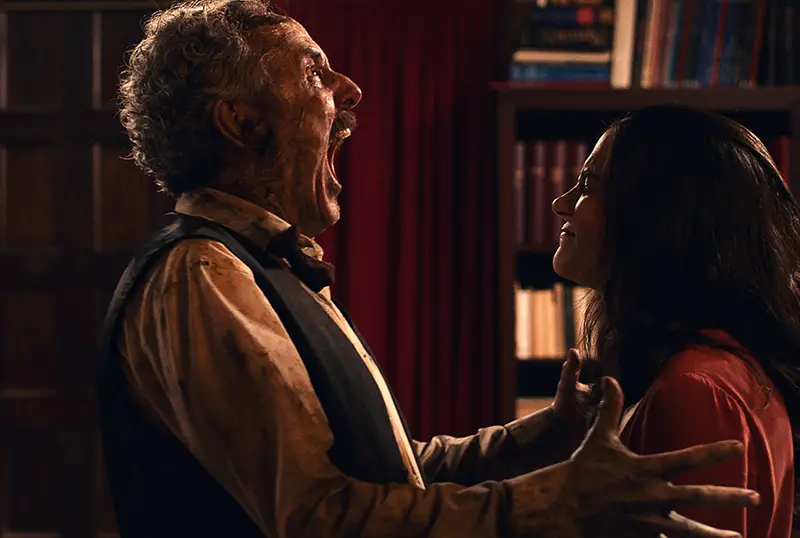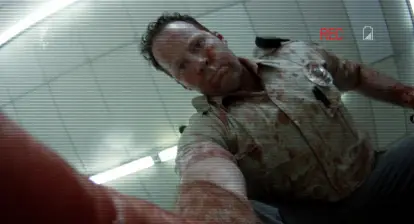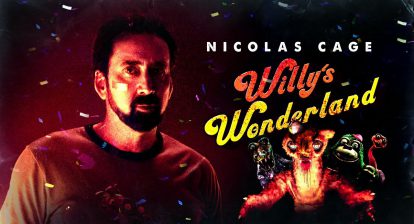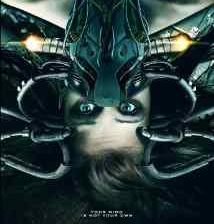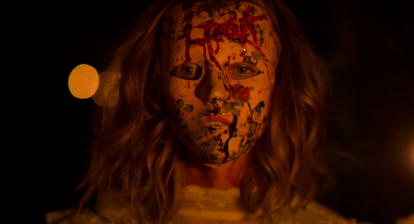The LA indie comedy scene can be a killer, and in the case of Gravitas Ventures’ latest release Too Late, it’s just that. Directed by D.W. Thomas, the horror/comedy follows Violet Fields, as she works a thankless job assisting Bob Devore, a famed comedian and host of the live variety show, Too Late. But what only Violet knows is that Bob is a monster both literally and figuratively. Resigned to her fate, Violet is caught by surprise when she meets aspiring comedian Jimmy Rhodes and sparks fly. But as her feelings for Jimmy grow and Bob starts to doubt her loyalty, she and Jimmy could end up as Bob’s next meal. Because most of the talent involved has dabbled in comedy themselves, the film doesn’t take itself too seriously, making it an enjoyable story to watch. Also adding to the quirkiness, is the score by composer Mikel Hurwitz, whom used instruments such as the accordion and digeridoo to create a unique blend on fun and fright. In the below exclusive interview, Mikel goes more in depth about his work on the film. Listen to Mikel’s Too Late score here.

Wicked Horror: Before beginning work on the film, how long did it take you to find the right sound palate for the project? What is that process like?
Mikel Hurwitz: The tone for the score all really came out of the initial conversations with DW and Tom (the director and writer/producer). They knew the score needed some connection to bring Bob’s character to life and since his back story was that he is from a non-descript ‘Baroque to Victorian’ Europe and evolved through Vaudeville, there was a lot to work with musically. Because he is a time and place wanderer, rooted in Europe, the first thing that came to mind was a klezmer/Roma (gypsy) tone. I didn’t want to make it overt, so just extracted the accordion and the harmonic minor scale to build Bob’s thematic material around. And since I was already on that road, we needed another sonic element that fit into Bob’s historical context that could help play the comedy and substitute for the sharp attack of a more traditional comedic element like the pizzicato strings, so, I thought the harpsichord would work well.
We had these two instruments to pull from for leitmotif and thematic material but then the trick was to round out the sound of the score with a blend of synths and orchestra to give it a more contemporary, well rounded sound. From there, I wrote the opening scene and basically by the 2nd version the filmmakers were onboard with the approach, and we parsed out and developed elements from the opening cue to the rest of the film.
Wicked Horror: You have talked about getting inspiration for the score from The Witches of Eastwick. What is it about that film that intrigued you?
Mikel Hurwitz: It wasn’t really the film as much as the score that gave inspiration. There is a great tone in that score that has a kind of quirky brand of light horror that only John Williams can pull off. It was exactly what the DW and Tom were talking about for Too Late: living in the horror realm without getting too deep into the adrenaline inducing roller coaster of it.

Composer Mikel Hurwitz
Wicked Horror: Soundtrack Mill released your score to the film. If you could point to one track for audiences to listen to, which one would it be?
Mikel Hurwitz: It’s actually a pretty diverse soundtrack, I think, so it’s all worth a listen; but if you were going to choose one track, the first track “Too Late Main Titles” is a fun one.
Wicked Horror: You used an accordion in the score, around some of the scenes with Bob. One doesn’t often hear the accordion in horror films, what made you decide this tone? Do you play the accordion often in any of your other projects?
Mikel Hurwitz: I talked about this a little in a previous question, but the accordion decision evolved directly from the initial conversations with the director and writer/producer. It’s true that you don’t hear it often in horror scores but since this was a comedy that was superimposed over top of a horror landscape (in my mind, at least), we had the opportunity to use some instruments that were outside of the conventional contemporary horror scoring language.

Wicked Horror: Sound design in horror films plays a big part. How close did you work with the Too Late sound designer?
Mikel Hurwitz: It’s true, but actually for Too Late, I just received a version of the sound design/sound effects track that was quite close to the final version to score around. I’m always hyper conscious of sound design while scoring and even though there wasn’t an explicit ‘back-and-forth’ conversation I had with the sound designer, since I was working with their tracks in my writing template, their work communicated all it needed to so that it resulted in an effective collaboration.
A good example of this was the sound of Bob eating off screen – I knew that sound would either get a cringe or a laugh from the audience, so I chose to build the music to that sound then dip out so it would have 100% of the audio spectrum instead of competing with music.
Wicked Horror: In one of the comedy shows there is a juggling comic, and very circus-like music playing during his set. What sort of instruments did you use for this sequence?
Mikel Hurwitz: Ya, this was purely my interpretation of what a vaudeville or circus band might have sounded like scoring a juggler in the 1920s. This was probably the most conventional instrumentation that existed in the score – it was purely orchestral instrumentation (strings, woodwinds, brass, percussion) with an emphasis in the mix on the cymbals and the xylophone, mixed louder you might hear it in a concert hall.
Wicked Horror: A lot of composers use “found objects” in their scores. Did you use anything different like this in your Too Late score?
Mikel Hurwitz: I didn’t feel that this score called for that since the ‘scares’ were still 20% comedy (at least in my mind). There was however a hidden backstory for Bob that he became this vampire-like monster from being eaten hundreds of years ago by an Australian Aboriginal mythic monster, the ‘Yaramayhawho’. We never really get this story about his history but it was part of the mythology that Tom, the writer, built Bob around. The musical easter egg is: I built one of the main synth pulse patches that we hear throughout the film from a digeridoo recording.

Wicked Horror: You worked with Danny Elfman for many years. Danny is obviously the genius behind all of Tim Burton’s films, which tend to be dark and genre specific. What is it about Danny’s scores that you think resonates so well with audiences?
Mikel Hurwitz: Danny’s scores are uniquely his because of many reasons but I think they have a distinct harmonic and rhythmic language that he pulls from that he’s developed through his musical evolution. Perhaps more than that, since he comes from a demented version of 80s pop music (Oingo Boingo) where he was the lead vocalist, he really knows how to write a catchy melody and has utilized that in his film scores. It’s often melody that audiences walk away from the theater singing, not some odd sonic texture, because as humans our brains are hard-wired to understand and recall melody. It’s for that reason that melody that has the most potential for mass appeal and resonance.
–Wicked Horror: Do you have a favorite horror film? Why did it leave such an impression on you?
Mikel Hurwitz: I’m a big fan (and student of) Bernard Hermann, so I’d be hard pressed to not put some Hitchcock on the list, and there’s nothing more iconic in my mind than Psycho, as cliché as it is to say. The violins in the shower scene are obviously part of the cultural zeitgeist but the rest of the score is an absolute masterclass on using unique orchestration to build and release tension.
Since I’m bad with ‘favorites’ though, I’ have to give two: The first horror film that I watched as a kid that had a deep impact was Alien, and though I didn’t know who Jerry Goldsmith was at the time, I would later learn how deeply masterful his work is, study him and be inspired from his work.

